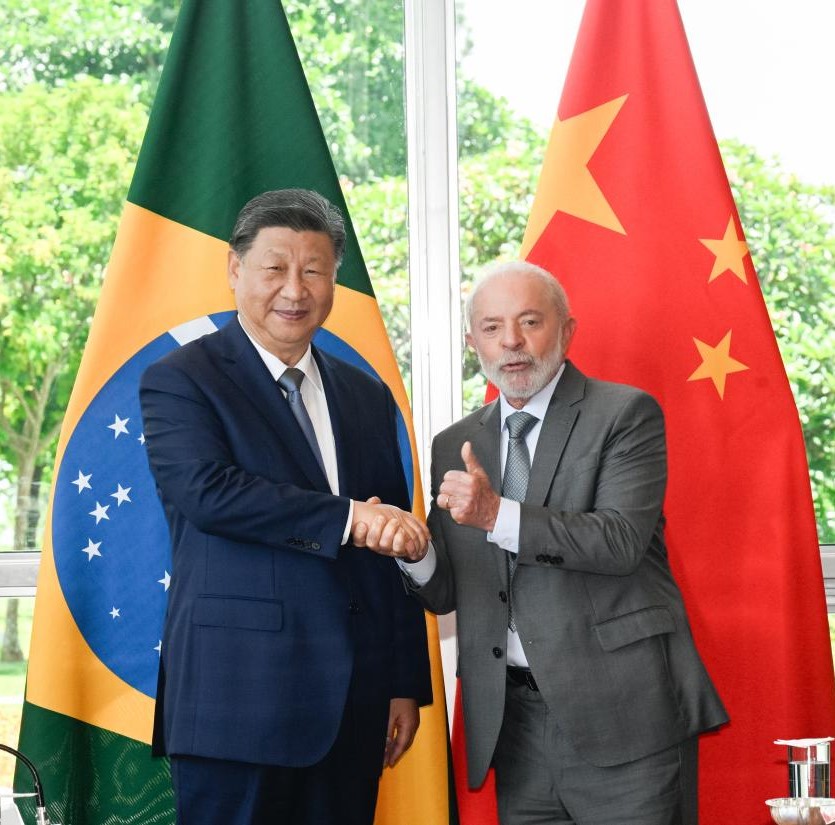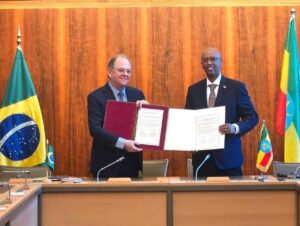China and Brazil Strengthen Strategic Partnership for a Just and Sustainable Future

Brasilia, The Gulf Observer: In a significant step towards enhancing bilateral relations, China and Brazil announced on Wednesday their decision to elevate their ties to a shared community with a vision for a more just world and a sustainable planet. The decision was made during a high-level meeting between Chinese President Xi Jinping and Brazilian President Luiz Inácio Lula da Silva, who are both committed to shaping a future rooted in mutual respect and development.
Xi, who is on a state visit to Brazil after attending the 19th G20 Summit in Rio de Janeiro, expressed that China and Brazil, as two major developing countries in their respective hemispheres, have forged a robust and enduring partnership over the past 50 years. He emphasized that the China-Brazil relationship transcends geographical boundaries and has established a framework for developing nations to engage in mutual respect and benefit.
“Brazil is the first country to establish a strategic partnership with China, and the first Latin American nation to forge a comprehensive strategic partnership,” Xi said, highlighting the historical significance of the relationship. He added that both countries have increasingly become reliable friends and positive forces for peace under the leadership of their heads of state.
The Chinese President further noted that the China-Brazil partnership is at its best in history, having not only advanced the well-being of their citizens but also defended the common interests of developing nations, amplified the voice of the Global South, and contributed significantly to global peace and stability.
The two leaders also agreed to align their respective development strategies, with China’s Belt and Road Initiative (BRI) being integrated into Brazil’s national development framework. Xi hailed this decision as a historic moment, reinforcing the long-term, global, and strategic nature of their cooperation.
“We are ready to work with Brazil to continually enrich our relations, be golden partners who help each other succeed, and build a community with a shared future for mankind,” Xi stated. He also emphasized the importance of strengthening people-to-people exchanges in culture, education, and youth to further consolidate public support for the bilateral partnership.
Looking ahead, Xi outlined key areas of focus, including cooperation in infrastructure, finance, science, technology, clean energy, and environmental protection. He emphasized that China prioritizes poverty alleviation and expressed support for Brazil’s Fome Zero (Zero Hunger) program, with the goal of improving the lives of both nations’ citizens.
President Lula reciprocated, acknowledging China as Brazil’s most important strategic partner and a trusted friend. He emphasized that Brazil looks forward to using Xi’s visit as a foundation for achieving even more tangible results in bilateral relations. Lula also underscored that Brazil’s development strategies, including the New Growth Acceleration Program and the Routes for South American Integration initiative, align closely with China’s BRI and will drive Brazil’s reindustrialization and South American integration.
The Brazilian leader reiterated Brazil’s opposition to the “new Cold War” and its advocacy for a multipolar world where global governance is based on equality, mutual respect, and cooperation. He also expressed gratitude for China’s support of Brazil’s G20 presidency and their joint efforts to enhance the influence of the Global South in shaping global policies.
Following their discussions, the two leaders addressed the media, with Xi emphasizing the importance of multilateralism in addressing global challenges. He stressed the need for a political resolution to the Ukraine crisis and called for a ceasefire and a lasting peace agreement in Gaza.
“China and Brazil share the tradition of upholding justice and morality. Together, we will firmly defend multilateralism and work towards building a better world, one of development, cooperation, and justice,” Xi concluded.
Lula, for his part, highlighted that despite the geographical distance, Brazil and China share common values and strategic interests. He reaffirmed that the two nations would continue to deepen communication and cooperation in multilateral frameworks such as the United Nations, BRICS, and G20, with a shared goal of advocating for reforms in the global governance system.
With both leaders committed to strengthening their ties, the China-Brazil partnership is set to continue playing a pivotal role in shaping a more just, democratic, and sustainable global order.
